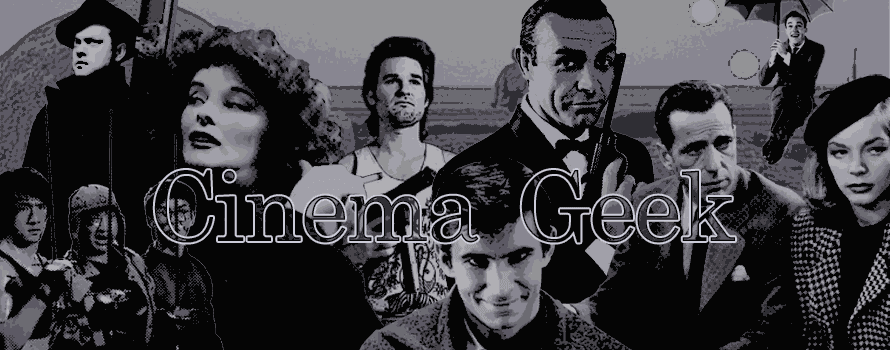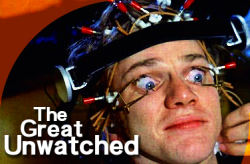 "Just what do you think you're doing, Dave?"
"Just what do you think you're doing, Dave?"To a certain extent, this can be said of virtually every film included in this, the 52 Perfect Movies series--but it is especially true of Stanley Kubrick's 2001: A Space Odyssey: It almost requires no explanation at all for this film to be included here. 2001 is a work of pure, undistilled genius; a breathtaking piece of art put forth into this world by the combined intellects of Kubrick and the legendary Arthur C. Clarke, to be savored, pondered and debated for all time to come.
As science fiction epics go, it is the gold standard--an intoxicating, cerebral journey into the issues that resonate most deeply with the human race as a species, and with the human being as individual. There are no laser guns required, no Flash Gordon-esque childish gimmickry on display. This is science fiction for grown-ups, that speaks to us on a mature level, in our own time and place, rather than a long time ago in a galaxy far, far away.
 Kubrick famously rebuked those who tried to get him to explain the much-discussed finale to the film, insisting that they had to figure it out for themselves. Perhaps he was being clever, or perhaps he actually didn't quite know himself, but I will forgive him this bit of obtuseness. Whatever it may actually mean--and I have several theories, but this is not the place for them--it is quite true that it exists on another level, beyond the intentions of Kubrick or Clarke. It, like the rest of this monumental film, is there for the viewer to experience, to digest, to absorb and make of it what he will. Art at this level owes us no easy explanation.
Kubrick famously rebuked those who tried to get him to explain the much-discussed finale to the film, insisting that they had to figure it out for themselves. Perhaps he was being clever, or perhaps he actually didn't quite know himself, but I will forgive him this bit of obtuseness. Whatever it may actually mean--and I have several theories, but this is not the place for them--it is quite true that it exists on another level, beyond the intentions of Kubrick or Clarke. It, like the rest of this monumental film, is there for the viewer to experience, to digest, to absorb and make of it what he will. Art at this level owes us no easy explanation.Taking a genre of film that had long been the province of Saturday afternoon serial matinees or chintzy post-war monster movie fare, and elevating it to a place of beauty and depth of thought and feeling rarely seen in film, 2001 is the definition of a cinematic landmark. And even if the science fiction genre never quite lived up to the promise of this film, that does not take away from its achievement.
 We see Kubrick here cementing his other-wordly, sterile, appropriately alien directorial style, approaching the material with the precision of a surgeon and the uncanny depth of perception we might actually expect from an observant alien race. The man was a gift to the craft of film-making, and it's entirely possible that this fact was never so completely established as in this motion picture, a model of perfection in editing, cinematography and sound design, among many other things.
We see Kubrick here cementing his other-wordly, sterile, appropriately alien directorial style, approaching the material with the precision of a surgeon and the uncanny depth of perception we might actually expect from an observant alien race. The man was a gift to the craft of film-making, and it's entirely possible that this fact was never so completely established as in this motion picture, a model of perfection in editing, cinematography and sound design, among many other things.As in much of Kubrick's work, it is the bigger picture here that takes us in and holds us. Kubrick was a stylized film-maker, no doubt about it, and here he sets a pace that certainly takes its time, paradoxically whizzing across various distant epochs in time, and millions of miles of space, and yet always moving at an even keel, fascinating us with the way the story is carefully unfolded, the characters patiently revealed to us. To those weened on music video editing styles, a film like this may seem a chore indeed, and that is quite sad. Because although it moves at anything but a brisk pace, this is the kind of film that must be slowly and deliberately savored, and rewards those who do.
 From the masterful scenes at the "Dawn of Man", featuring tribes of primitive ape-men so convincing that suspension of disbelief is a non-issue, to the clean, bright, deceptively calm moments during the Jupiter mission, A Space Odyssey is an unstoppable juggernaut of a movie, cruising majestically along, metaphorically towering above the viewer like the implacable monolith itself. Here at the start of what many refer to as the "modern era" of movie-making, Kubrick shows us how it's done, setting the bar extremely high--perhaps too high, really--for any who woud dare to come after him, and taking the very practice of film-making to places previously undreamt of.
From the masterful scenes at the "Dawn of Man", featuring tribes of primitive ape-men so convincing that suspension of disbelief is a non-issue, to the clean, bright, deceptively calm moments during the Jupiter mission, A Space Odyssey is an unstoppable juggernaut of a movie, cruising majestically along, metaphorically towering above the viewer like the implacable monolith itself. Here at the start of what many refer to as the "modern era" of movie-making, Kubrick shows us how it's done, setting the bar extremely high--perhaps too high, really--for any who woud dare to come after him, and taking the very practice of film-making to places previously undreamt of.Keir Dullea and Gary Lockwood are terrific as Dr. Bowman and Dr. Poole, the passengers on board the Discovery. And yet, the performance best remembered is that of Douglas Rain as the voice of the computer HAL-9000, whose tragic malfunction and spiral into madness is at the heart of what this movie is all about. Among Kubrick's fascinations was the conflict of the human against that which seeks to dehumanize or automate humanity, and nowhere in his body of work (although Full Metal Jacket comes close) is this theme so directly explored.
The concept of the foolproof, beautifully choreographed scenario slowly sent completely off-kilter into utter choas--this is another favorite idea of Kubrick's, and it's no wonder he took so thoroughly to Clarke's material, as it speaks to this concern of his quite directly. Clarke himself often said that with 2001, he wanted to raise more questions than he answered. Most devotees of the film (and actually, probably most of its detractors) would agree that he succeeded in doing just that.
 The strains of Strauss' Also Spracht Zarathustra, famously used to such powerful effect in this film, almost serve to act as something of a clarion call, waking the movie-going public up to the notion that the era of the auteur film-maker had arrived; that directorial visionaries would, more than ever before, be able to create deeply personal works that directly expressed their souls, with far less outside intervention than the studio system had ever allowed. And to a lesser degree, among those who devoted themselves to genre entertainment, it demonstrated that speculative fiction in cinema could do the very same thing it had been doing for decades in literature.
The strains of Strauss' Also Spracht Zarathustra, famously used to such powerful effect in this film, almost serve to act as something of a clarion call, waking the movie-going public up to the notion that the era of the auteur film-maker had arrived; that directorial visionaries would, more than ever before, be able to create deeply personal works that directly expressed their souls, with far less outside intervention than the studio system had ever allowed. And to a lesser degree, among those who devoted themselves to genre entertainment, it demonstrated that speculative fiction in cinema could do the very same thing it had been doing for decades in literature.When discussing greatness in film-making, from a technical point of view, 2001: A Space Odyssey is a film that will invariable be brought up, and rightfully so. It is a sumptuous delight to watch and to listen to, with its groundbreaking (and actually realistic) special effects and brilliant use of classical music, and yet it is also much more than that. It is a film that becomes more than a film. It is an experience. It is a journey, into the self, into that which is beyond ourselves. In short, it is the kind of a narrative work that comes along once in a lifetime.
NEXT UP: The Odd Couple (1968)



